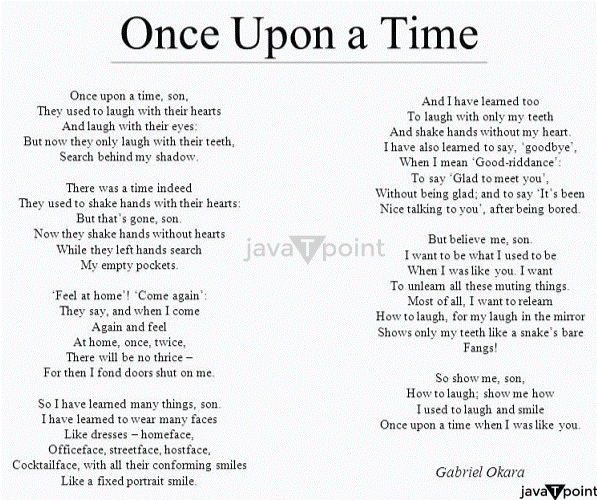Once Upon a Time by Gabriel Okara SummaryThe poem has a sentimental tone to it. In this poem, the author expresses his distress about the false and dishonest behavior of grownups. He claims that individuals back then acted more honestly and openly. However, people nowadays are highly deceptive and claim to be kind to everyone. Additionally, they make a show of showing everyone they care, love, and affection, yet all of these sentiments are phony. Regarding the past, the poet is conflicted. He exudes an air of pride in the people and how they have interacted with others in the past. He regrets the fact that uniqueness and purity are no longer valued in society. About the AuthorGabriel Okara is the author of the poetry "Once Upon a Time". He is an author and poet from Nigeria. On April 24, 1921, he was born in Nigeria. He is one of the first poets of contemporary Africa. To investigate tradition and change, he turned to folklore, religion, myth, and social concerns. In 1978, he released "The Fisherman's Invocation," a book that contains the poetry. Gabriel Okara was the first African Modernist poet. He depicted African ideas, religion, mythology, and imagery in his works. Along with "Piano and Drums" and "You Laughed and Laughed and Laughed," "Once Upon a Time" is one of Okara's best-known poems. Okara's lyrical character in this poem is concerned with what's happening to Africa's old cultures. This poem illustrates the crises in indigenous culture brought on by the influence of Western civilization. His "Collected Poems" was released by the University of Nebraska in 2016 and included this poem. He passed away in Nigeria on March 25, 2019. 
Theme of the PoemThe themes of cultural crisis, greed, loss of innocence, and genuine feeling vs. artificial expression are all present in Okara's poem "Once Upon a Time." The cultural crisis is the primary subject of this poem. This subject is central to the poem even if readers cannot discover it in the text explicitly. For instance, the poet's persona truly discusses his indigenous culture's dilemma when he talks about modern greeting trends. In his tone, he conveys a feeling of loss. Along with it, this poem also addresses the loss of innocence. I want to unlearn all this muting stuff that is connected with this theme. Throughout the narrative, it is also shown how people fake it by masking their true feelings. Structure of the PoemThe 43 lines of this poem are broken up into seven stanzas. There is no established number of lines in each stanza. According to the topic matter, the lines are divided. The first-person narrator's perspective is used to write this poetry. Thus, it is a lyric. It is a free verse poem since the language doesn't follow a set rhyme pattern. Readers may come across rhyming, but it doesn't always happen that way. Other than that, the poem is mostly written in iambic meter with a few metrical deviations. Summary of the Poem
Gabriel Okara's poem "Once Upon a Time" has a father and son having a talk. The father explains how greeting one another has devolved into a simple exchange of manufactured grins. Three images?welcoming someone to their home, saying farewell, and greeting someone?make up the first section of this poetry. The poem's narrator explains how people respond under certain circumstances to his kid. They start by pretending to smile when they welcome their friends and family. Although they formally provide a warm welcome to their loved ones, psychologically, they keep their doors locked. Finally, they put on a phony grin once again as they wish each other farewell while masking their egotistical feelings. When the speaker considers such things, he gets so depressed that he somehow wishes to relearn such meaningless traditions. In order to rediscover the art of purity and unadulterated joy, he yearns to be a kid once more like his son. In the opening verse, the author notes that people used to laugh from the bottom of their hearts and the depths of their emotions. When they laughed, they did it warmly and totally, and they used to laugh with their eyes as well, expressing their joy. And they are aware that they are just laughing with their teeth and not their hearts, which indicates that they are only laughing to get closer to you. They also keep an eye on you and wait for you out of the corner of their eyes, saying, "Search behind my shadow," due to their dark, gloomy eyes. According to interpretation, the term "they" refers to the white people who colonized their nation and affected it with their culture. The phrase "ice-block-cold eyes" is used in this verse to emphasize the icy nature of their look as well as their underlying contempt for you. Additionally, they give the poetry a rather gloomy, chilly, and menacing vibe. When he writes, "they used to shake with their hearts" in the second verse, he is attempting to convey the idea that when you meet, you will shake hands with warmth and joy out of a sincere desire to be friendly. He continues to discuss the characters of the people of the past. Inferred from the phrase "while their left hands search my empty pockets" is that they are attempting to utilize him as a means of gaining access to his money or obtaining anything from him. This further demonstrates the falsity of the characters' personas. In the third stanza, he talks about how the first time you go somewhere and they say, "Feel at home," they allow you in, but the second and third times, they won't let you in because they believe you are a bother and that they don't want to see you again. The phrase "feel at home" is used when you want a visitor to feel at ease and like a member of the family. In this sentence, he says, "I find the doors shut on me," which implies that they didn't even open the door to let him know he wasn't welcome at the time but instead left it closed, leaving him outside. This further demonstrates how when individuals talk, they lie, not revealing the truth but only saying kind things to win others over. In the fourth stanza, he discusses how he has learned to adopt various personas, much like how people don different outfits and masks at various times. He also discusses how different people react in different situations, such as how one might act one way towards someone in the office but in a different way when they run into them on the street. When he adds, "I have learned too," he is implying that he has changed along with others around him. Additionally, he adds, "with all their conforming smiles like a fixed portrait," meaning that since they all have the same smile, they never show true emotion. The first stanza's line "they only laugh with their teeth" and the phrase "to laugh with only my teeth" are connected, enabling you to compare what others do with what he does today. He asserts in the fifth verse that he has also been affected by others around him and has discovered how to conceal his own self and show a phoney one to the public. This further demonstrates his transformation into his surroundings. The statement "I have also learned to say "Goodbye" when I mean "Good-riddance" here is a reference to the fact that people will say "Goodbye" out of habit and without intending to. Future he says, "that Glad to meet you," that he is glad to see you and that he is glad of your presence, "without being glad," that they did not want to talk to you, that they disliked your presence and would have avoided you if they could, and "it's been nice talking to you, after being bored," that they say things that they do not mean. He wraps it all up in the fifth stanza by lamenting his transformation and expressing a desire to return to his younger, more innocent self. He makes the point that he wants to learn how to laugh with genuine emotion and compares his laugh to a snake's fangs, which only reveal the teeth. To compare his chuckle to a snake means that the guy does not like his false character as snakes are those dreadful animals that are full of poison and can never be trusted. This stanza succinctly sums up the problem by letting the reader know that he is not happy and comfortable with himself. The speaker begs and pleads with his kid in the last line to teach him how to grin and laugh like he did when he was a youngster. The last line of the poem perfectly summarises it all, tying together all the loose ends. The poem has an extremely strong and consistent structure. Six lines are seen in the majority of the stanzas. The poem has a lovely flow and is extremely wonderful. ConclusionThe poet draws our attention to how hollow individuals have become. This poem encourages us to abandon the fake smiles and manners that society pressures us to acquire and to rediscover what it is to be innocent and joyful.
Next TopicOru Manushyan Summary
|
 For Videos Join Our Youtube Channel: Join Now
For Videos Join Our Youtube Channel: Join Now
Feedback
- Send your Feedback to [email protected]
Help Others, Please Share









